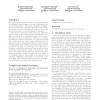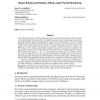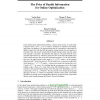10 search results - page 2 / 2 » Regret to the Best vs. Regret to the Average |
CVPR
2010
IEEE
14 years 1 months ago
2010
IEEE
Multiple instance (MI) learning is a recent learning paradigm that is more flexible than standard supervised learning algorithms in the handling of label ambiguity. It has been u...
PODC
2009
ACM
14 years 5 months ago
2009
ACM
We analyze the performance of protocols for load balancing in distributed systems based on no-regret algorithms from online learning theory. These protocols treat load balancing a...
JMLR
2010
13 years 1 days ago
2010
This work deals with four classical prediction settings, namely full information, bandit, label efficient and bandit label efficient as well as four different notions of regret: p...
NIPS
2007
13 years 6 months ago
2007
In the online linear optimization problem, a learner must choose, in each round, a decision from a set D ⊂ Rn in order to minimize an (unknown and changing) linear cost function...
CORR
2010
Springer
13 years 4 days ago
2010
Springer
We consider an opportunistic spectrum access (OSA) problem where the time-varying condition of each channel (e.g., as a result of random fading or certain primary users' activ...




